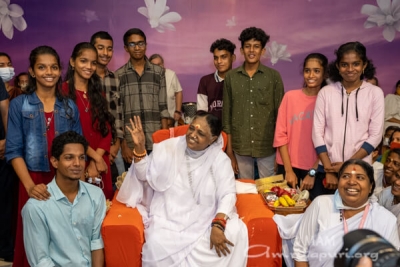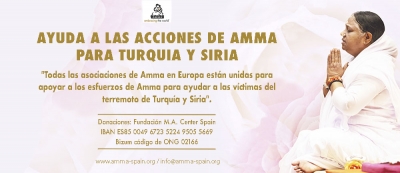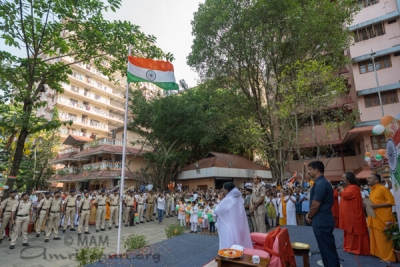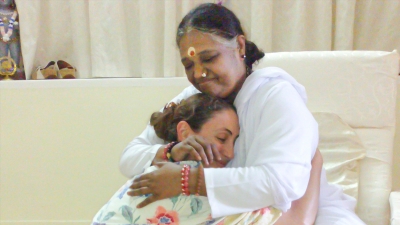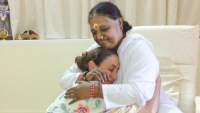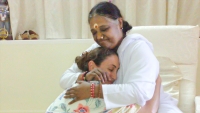La lección de Amma sobre la importancia de recordar el mantra
Aprendamos esta lección en serio y continuemos recitando el mantra, siguiendo en el camino de la shadana con devoción y determinación.
Amma estaba dando darshan a sus devotos cuando Kaushik se le acercó con una petición. Él había recibido un mantra de Amma hacía años, pero lo había olvidado y ahora necesitaba que Ella le aconsejara. Amma le escuchó atentamente e hizo a Kaushik una serie de preguntas para ayudarle a recordar el significado del mantra.
“¿Recuerdas a tu esposa? ¿Recuerdas tu nombre? ¿Tú solo comes, duermes y vas al baño, eh?”
“Rodeas a tu esposa con tu mano cuando camináis juntos, y te sientes feliz haciendo simplemente eso” continuó Amma.
Interacción con los niños y una lección de atención consciente
6 Febrero 2023, Amritapuri Ashram
Los bhajans diarios de la tarde en el ashram están siempre llenos de alegría, risas, amor y paz. Es el momento en el que se reúne la comunidad para conectar con lo Divino mediante la música y las oraciones. En una de estas sesiones de bhajans, Amma estaba interactuando con los niños y uno de ellos, Aravanid, estaba especialmente inquieto. Hablaba con otros niños, saltando en el regazo de su abuelo y en general, comportándose de forma extraña.
Amma dándose cuenta llamó a Aravanid. Le pidió que se sentara y estuviera callado y tranquilo. Le pidió que no se moviera innecesariamente. Amma explicó la necesidad de estar atento a todos y cada uno de los movimientos. “Deberíais observar que vuestras manos están moviéndose, escuchar lo que decís, deberíais ver todo lo que hacéis. Esto os conducirá a la meditación.”
La compasión y la bondad pueden aportan esperanza y alegría
Amma patrocinó la cirugía de reversión de ligadura de trompas a seis mujeres que perdieron a sus hijos en el tsunami del Océano Índico del 2004. Las familias de estos niños han venido a ver a Amma y han podido fotografiarse con Ella.
7 de febrero 2023, Amritapuri
El término “bebés del tsunami” se refiere a los hijos nacidos de aquellas mujeres que no podían tener hijos tras el tsunami del Océano Índico del 2004. Después del tsunami, varias mujeres de aldeas cercanas a Amritapuri, vinieron para contar a Amma su especial y trágico problema. No solo habían perdido a sus hijos en el desastre, sino que tampoco podían tener más hijos, ya que hacía tiempo que habían optado por la ligadura de trompas como forma de control de natalidad.
Embracing The World - Ayuda para Turquía y Siria
Om Namah Sivaya
Todos somos conscientes del enorme desastre causado por el erremoto en Turquía y Siria, que se ha cobrado miles de vidas y ha dejado tantos heridos, junto con la enorme pérdida de propiedades. Amma ha acordado que todas nuestras organizaciones recauden fondos para el trabajo de socorro allí.
Swami Shubamritananda Puri
Donaciones: Fundación M.A. Center Spain, IBAN ES85 0049 6723 5224 9505 5669. Bizum código de ONG 02166. https://www.amma-spain.org/es/donaciones / Aquesta adreça de correu-e està protegida dels robots de spam.Necessites Javascript habilitat per veure-la.
OM NAMAH SHIVAY
Estar agradecidos a esta tierra sagrada que nos ha amamantado
Tenemos que recordar con gratitud la valentía y la determinación de nuestros antepasados, que lucharon por la libertad, y a los soldados y oficiales de policía por construir este gran país al que llamamos hogar.
26 de enero 2023, Ashram de Amritapuri
Amma presidió las ceremonias del ashram de Amritapuri para honrar y celebrar el 74º aniversario del Día de la República de India.
Amma izó la bandera nacional frente al ashram y presentó sus respetos a los soldados y oficiales de policía que sirven y protegen al país.
La visió d'Amma's Way: una entrevista amb la documentalista Anna Agnelli
Agnelli explica com la pel·lícula sobre Amma es va inspirar en les persones que treballen incansablement per encapçalar els seus projectes humanitaris globals.
Mentre contempla la vasta extensió de mar i cel a la platja d'Amritapuri, Anna Agnelli reflexiona sobre la primera trobada amb Amma. La documentalista italiana s'ha mogut en el camí espiritual des de molt jove. La seva curiositat pel significat de la vida li va sorgir quan encara era una nena. Però als 18 anys, quan el seu germà va morir de càncer, la cerca es va centrar encara més.
The vision of Amma’s Way: An interview with documentary-maker Anna Agnelli
Agnelli explains how the film about Amma was inspired by the people who work tirelessly to spearhead her global humanitarian initiatives.
Looking out at the vast expanse of sea and sky before her eyes at the beach in Amritapuri, Anna Agnelli reflects upon her first meeting with Amma. The Italian documentary-maker has been on a spiritual path from a very young age. Her curiosity about the meaning of life came to her when was still just a child. But at 18 years old, when her brother died of cancer, the quest became focused.
La visión de Amma’s Way: una entrevista con la documentalista Anna Agnelli
Agnelli explica cómo la película sobre Amma se inspiró en las personas que trabajan incansablemente para encabezar sus proyectos humanitarios globales.
Mientras contempla la vasta extensión de mar y cielo en la playa de Amritapuri, Anna Agnelli reflexiona sobre su primer encuentro con Amma. La documentalista italiana se ha movido en el camino espiritual desde muy joven. Su curiosidad por el significado de la vida le surgió cuando aún era una niña. Pero a los 18 años, cuando su hermano murió de cáncer, su búsqueda se centró todavía más.
Discurs complet d'Amma: Inauguració del Civil 20 de l'Índia el 2023
El 16 de gener es va dur a terme a Amritapuri la cerimònia inaugural del Grup de Treball Civil 20 (C20) per a la Presidència del G20 de l'Índia. Amma és la presidenta del C20, que té com a objectiu portar les preocupacions de les Organitzacions de la Societat Civil (OSC) als caps d'estat de les principals economies del món. Com a país amfitrió d'aquest any, la cimera del G20 tindrà lloc a Nova Delhi el proper setembre.
Amma’s Full Address: Inauguration of India’s Civil 20 2023
On January 16th, the Inaugural Ceremony of the Civil 20 Working Group (C20) for India’s G20 Presidency was held in Amritapuri. Amma is the Chair of C20, which has the purpose of bringing the concerns of Civil Society Organisations (CSOs) to the Heads of State of the world’s leading economies. As this year’s host country, the G20 Summit will take place in New Delhi this September.
More...
Discurso completo de Amma: Inauguración del Civil 20 de la India en 2023
El 16 de enero, se llevó a cabo en Amritapuri la ceremonia inaugural del Grupo de Trabajo Civil 20 (C20) para la Presidencia del G20 de la India. Amma es la presidenta del C20, cuyo objetivo es llevar las preocupaciones de las Organizaciones de la Sociedad Civil (OSC) a los jefes de estado de las principales economías del mundo. Como país anfitrión de este año, la cumbre del G20 tendrá lugar en Nueva Delhi el próximo septiembre.
Amma inicia un projecte humanitari de 6,25 milions de dòlars com a part de Civil 20 India
Amma ha iniciat un projecte de 6,25 milions de dòlars per recolzar el benestar de les persones amb discapacitat i les dones embarassades desnodrides. El treball es durà a terme a districtes subdesenvolupats de l'Índia, així com a altres països en vies de desenvolupament. Embracing the World col·laborarà estretament amb les Organitzacions de la Societat Civil (OSC) locals per tal d'aconseguir un canvi tangible a la vida dels seus beneficiaris. Amma també espera així establir un precedent per a sistemes eficients i efectius, que posteriorment podrien ser adoptats per altres OSC i governs de tot el món.
Amma initiates $6 million+ humanitarian project as part of Civil 20 India
Amma inicia un proyecto humanitario de 6,25 millones de dólares como parte de Civil 20 India
Amma ha iniciado un proyecto de 6,25 millones de dólares para apoyar el bienestar de las personas con discapacidad y las mujeres embarazadas desnutridas. El trabajo se llevará a cabo en distritos subdesarrollados de la India, así como en otros países en vías de desarrollo. Embracing the World colaborará estrechamente con las Organizaciones de la Sociedad Civil (OSC) locales con el fin de lograr un cambio tangible en la vida de sus beneficiarios. Amma también espera de este modo establecer un precedente para sistemas eficientes y efectivos, que posteriormente podrían ser adoptados por otras OSC y gobiernos de todo el mundo.





